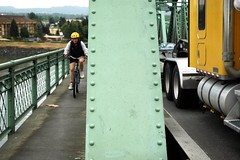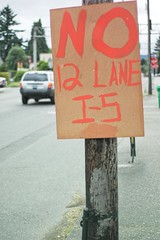“We will urge City Council not to write a blank check for a project that doesn’t meet the criteria we believe any new bridge should meet.”
–Planning Commission member Catherine Ciarlo
The nine-member Portland Planning Commission met last night to draw up their recommendations to Portland City Council on the $4.2 billion Columbia River Crossing project. City Council — one of eight agencies with veto power over the project — is set to vote on the project July 9th.
In a letter drafted by the Commission that is being sent to Mayor Potter and the Council, the Planning Commission says that while they believe a replacement bridge is necessary for safety, seismic, congestion mitigation and freight movement, they also have “serious concerns about the bridge design we have seen to date, and how it would impact the Portland metro area.”
In that letter they outline six “Essential elements of a new bridge”. The Planning Commission writes that the City Council should approve a replacement bridge but “ensure that it meets” the following “absolutely essential requirements”:
A. It should include light rail.
B. It should provide a… long-term solution to freight movement (as opposed to a temporary solution based on providing more capacity in the shorter term). That solution should give serious consideration to improving to the railroad bridge over the Columbia west of the proposed new bridge site.
C. It should include “world class” bicycle and pedestrian facilities that meet or exceed standards set by other projects in the Portland metro area and elsewhere.
…any new bridge should help Oregon achieve our stated greenhouse gas reduction goals by also reducing Vehicle Miles Traveled (VMT) in the region.
D. The project should be part of a comprehensive demand management strategy for the corridor, not simply a congestion management tool for the five miles of the Bridge Influence Area.
E. It should protect the health of the surrounding community, and promote equity in the city and the region.
F. It should be a fiscally responsible project that provides the lowest possible risk to the city and region — both in regard to actual bridge financing and to its “opportunity cost” impact on transportation projects over the next 30 years.
The Planning Commission says steeply rising oil and fuel will bring “a significant potential change in driving behavior” and that the price assumptions made by the CRC back in 2005 — for the price of oil and gas in 2030 — have already been exceeded (and in some cases doubled).
“It would be imprudent,” they say, for the CRC to not consider long-term changes in driver behavior.
In an email to me after last night’s meeting, Planning Commission member (and former executive director of the Bicycle Transportation Alliance) Catherine Ciarlo wrote that they don’t support “the bridge we’ve seen so far,” and that they’ll “urge City Council NOT to write a blank check for a project that doesn’t meet the criteria we believe any new bridge should meet.”
The Planning Commissions concerns have obviously been influenced by what they heard from Metro last week. Metro voted 5-2 to recommend the 12-lane option, but they also passed a resolution with several explicit conditions — including the formation of an independent oversight committee, a phased-in tolling plan, a promise that the project will cut VMT (vehicle miles traveled), and others.
The Planning Commission will recommend to Council that they “insist” on an oversight committee that will “guide key decisions about the size, design, and funding for the bridge. This committee would also have “explicit say over the design of the bike and pedestrian facilities.”
Also in the letter, the Commission has listed several actions for City Council to take. The list includes making sure the design of a replacement bridge is “beautiful” and insisting on a written funding plan for the bridge saying, “the City and its citizens should clearly understand the proposed sources of money for the project.”
While no official group has outright opposed a replacement bridge, the growing uneasiness with the direction of the project voiced by Metro and now with the Planning Commission makes me wonder about the upcoming City Council vote. If three Portland City Commissioners feel like the project is too far off track, it could derail the entire CRC effort.
So far, none of the commissioners has said much about how they’ll vote.
Commissioner and mayor-elect Sam Adams is in charge of the Office of Transportation and his commitment to sustainability and alternative transportation choices is well known. Would he be willing to risk the political backlash of a “no” vote just months from assuming leadership of the City? Or will he take a stance similar to Rex Burkholder (a Metro Councilor with a strong pro-environment record who ardently supports the project) and try to build a coalition of support around the controversial project?
Commissioner Saltzman is in charge of the City’s Office of Sustainable Development. Will concern over the project from groups like the Planning Commission, Metro, and the environmental non-profit Coalition for a Livable Future make him think twice about voting in favor?
Commissioner Leonard has often sided with Commissioner Adams on transportation-related issues.
It’s highly unlikely that Mayor Potter would rock the boat and vote “no” on this issue. But then again, he was very concerned about fiscal responsibility and the opportunity costs (remember the sidewalks in East Portland?) involved with the defunct Sauvie Island Bridge Relocation project (a $5.5 million project versus the CRC’s $4.2 billion tab).
And then there’s newly sworn-in (as of yesterday) Commissioner Nick Fish. Fish has told the Portland Tribune that he will “seek to find common ground” with Adams.
It will be interesting to watch how the discussion around the project progresses in the weeks leading up to the July 9th City Council vote.
Stay tuned.



